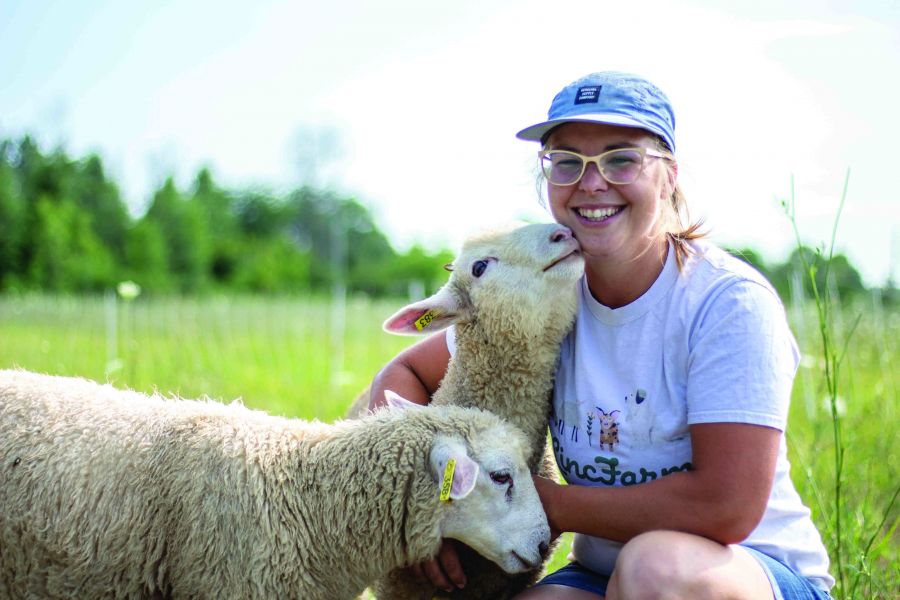If you follow Linc Farm on social media, you might think farm life is all calf kisses and sheep snuggles at the Niagara-on-the-Lake range.
In real life, Juliet Orazietti, half owner of the farm — and half the staff — works from dawn to dusk and beyond, seven days a week.
Her husband Martin Weber is the other, quieter half of the workforce. The rest of the team is three large white working dogs.
The farm is like something from a storybook, replete with lambs, piglets and steer calves that overwhelm with kisses, and a forest where the pigs live.
Orazietti herself, though she works hard, is always smiling and ready to chat.
And that’s the real story — all of the hard work that happens here.
Linc Farms is a livestock farm, where Orazietti raises livestock for meat. She makes no bones about it, speaking frankly about which animals will go to the butcher when.
At the same time, every animal on the farm has a name, and she cares for them with the love a good mother has for her children.
She has bottle-fed many lambs, keeping them alive with around-the-clock feedings, and handles the more difficult jobs too — a lamb born with an extreme health condition, for example, required immediate euthanization to end its suffering.
And she herself performs autopsies on animals that die of causes that aren’t immediately apparent.
You don’t want to mess with this woman.
Born and raised in Niagara-on-the-Lake, Orazietti studied pre-veterinary sciences at UBC, before realizing that becoming a large animal vet meant dealing mainly with sick animals on large commercial farms and changing paths to work towards a master’s degree in animal breeding and genetics.
She also has a mater’s degree in livestock science from BOKU University of Natural Resources and Life Sciences in Vienna, Austria.
Although she always dreamt of farming, she couldn’t imagine how it could actually happen, so she had assumed she would be an academic.
But ten years ago she got a call from Southbrook Vineyards — they wanted sheep to fulfil their goal of biodynamic certification and needed a shepherd, so during her summers off school, Orazietti managed the flock.
In 2015 she and Weber took over Southbrook’s Linc Farm, a 75-acre property where the couple now raise sheep, pigs, chickens and, as of this spring, cattle.
“Everything we do is about achieving high quality, highly marbled meat,” Orazietti said proudly.
“We deliberately choose breeds that are delicious and highly efficient. We’re not into lean.”
The pair has incorporated a technique of multi-species rotational grazing for their herds and flocks.
This dining dance around the property prevents the animals from getting parasites, as the farm doesn’t like to use deworming medications — although it does involve a lot of labour for the farmers.
Orazietti and Weber move the animals from one pasture to another daily, the chickens following the sheep and cattle.
“The chickens scratch the manure into the soil, and also eat any parasites. We haven’t had to deworm any sheep in three years.”
She’s also a keen observer of all of her livestock, noting the different personality traits and genetics of the animals.
“Hormones are so cool,” she said, referring to the dominant hen in her flock who — before they incorporated roosters, grew a larger comb, a hooked beak, and even stubs of talons; a roost-her.
Feed for the animals comes from a variety of sources, including mutually beneficial partnerships with Niagara College and Oast House Brewers.
Linc Farm takes the spent grain (mostly barley, some wheat) and fruit pulp from brewing processes, as well as grape skins from winemaking, and feeds it to the chickens and pigs.
The pigs move themselves from pasture to wallow to forest. It’s an oak forest, so there are plenty of acorns for the pigs to forage, and the couple has built shelters for the adult pigs (weighing up to 600 pounds) and their piglets.
“If you can’t build stuff out of skids, two by fours, and baling twine you’re not a farmer,” Orazietti said proudly.
A day of work for her and her husband includes fence building, water toting, building pig huts, occasionally purchasing a cow, collecting eggs, “and more fence building,” Orazietti said.
The livestock require more than 1,000 litres of water a day, all of which is trucked in by Orazietti and Weber and distributed by various contraptions they’ve built.
To protect the animals from the sun, they’ve also built a large shade structure on wheels, which Orazietti pushes around as though it were effortless.
When asked if being a woman farmer is a challenge, she laughed.
“Most people have moved beyond overt sexism. Just the occasional stupid comment like, ‘let me help you carry that, wouldn’t want you hurting yourself’ — same stuff all women deal with.”
Male farmers know their wives are tough, she said.
Ken Bartel certainly knows that. His wife Rose will be featured in the next instalment of “The farm-hers of Niagara-on-the-Lake,” in our August 15 issue.










